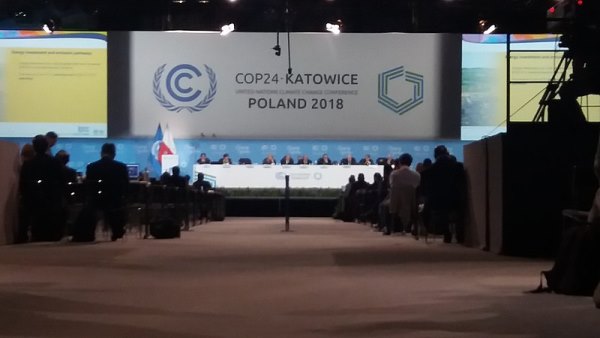Katowice COP24 Outcome Incompatible with Paris Agreement
Ambition, Equity, and Human Rights Left Behind in Poland Climate Talks.
Katowice, Poland—As parties to the UN Framework Convention on Climate Change wrapped up two weeks of negotiations in Katowice, Poland, the halls of the Spodek Center echoed with the rising voices of young people, indigenous groups, vulnerable communities, and people of all nations who demanded that negotiators deliver on the promises made three years ago in the Paris Agreement.

Plenary Session, COP 24, Poland
In October, a long-awaited IPCC report exposed the urgency and necessity to limit global temperature increase below 1.5 degrees Celsius and warned of the dire consequences for human rights, human lives, and the global environment if we fail to do so. In Katowice, Parties arrived with a clear mandate: translate the IPCC’s findings into a commitment to raise ambition; deliver a climate action package commensurate with the level of ambition and committed resources required to reach this goal; and adopt a rulebook to guide how it happens.
“We are deeply disappointed with the outcome of these negotiations,” said Erika Lennon, CIEL Senior Attorney. “Simply put, the outcome of COP24 is not compatible with the Paris Agreement, which promised to protect, respect, and
“The IPCC report made clear that respect for human rights and robust public participation are a prerequisite for effective climate action,” said Sébastien Duyck, CIEL Senior Attorney. “Not only have countries largely failed to adopt these recommendations in Katowice, but the COP itself casts a long shadow on the role and value of stakeholder engagement in UN climate processes. Poland’s overt exclusion of and attacks against civil society participants at the COP sends a chilling message about the direction of human rights protections at the UNFCCC. We look to Chile, a country that championed the adoption of the Escazú Agreement, the regional agreement on environmental democracy, to facilitate this process in a truly participatory manner going forward.”
“The failures here won’t stop the climate crisis, but nor will they stop people worldwide from taking urgent action to confront climate change,” said Carroll Muffett, President of CIEL. “Where negotiators are failing, people are rising—in the streets, in the courtrooms, in boardrooms. People are fighting against rising climate chaos with every tool they can find. And the governments and corporations must now decide if they will take bold action on climate or accept responsibility for failing to do so.”
Author’s Bio:
Amanda Kistler, Director of Communications and Development
Center for International Environmental Law (CIEL) New: 1101 15th Street NW, 11 Floor, Washington DC
Image credit


